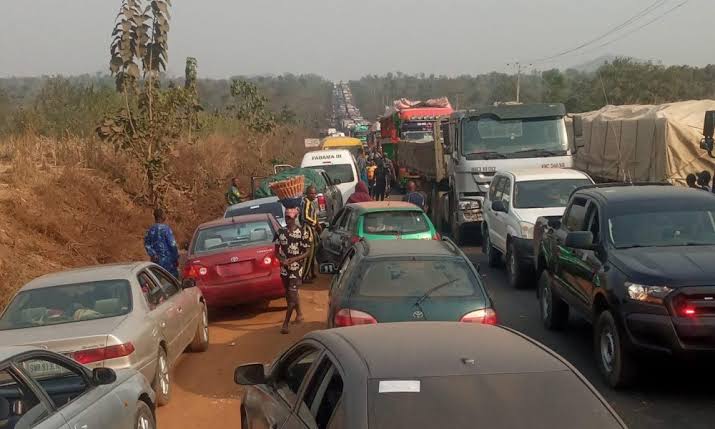The Abuja-Kaduna Expressway, a vital artery connecting Nigeria’s capital to the northern region, was brought to a standstill on June 5, 2025, as thousands of travelers headed home for the Eid al-Adha (Sallah) celebration. The severe gridlock, centered around Katari village in Kaduna State, stretched for kilometers, turning the usual two-and-a-half-hour journey into a grueling five-to-six-hour ordeal for many commuters. The congestion was triggered by a road traffic crash involving a fuel tanker, which blocked a critical section of the highway, exacerbating existing frustrations with the road’s poor condition.
The Federal Road Safety Corps (FRSC) confirmed that the tanker accident was the primary cause of the obstruction, with vehicles stranded in both directions as early as 6 a.m. Corps Marshal Shehu Mohammed personally led a team to clear the wreckage, restoring free movement by the afternoon of June 5. However, commuters reported significant delays before the intervention, with some noting the absence of FRSC officials for hours, leaving travelers to navigate the chaos unaided.
The Abuja-Kaduna Expressway has long been a source of concern due to its deteriorating state and ongoing, yet incomplete, reconstruction efforts. Sections of the road, riddled with potholes and narrow lanes, are ill-equipped to handle the heavy traffic volume, particularly during festive periods like Sallah. The reconstruction project, initiated to improve the 165-kilometer highway, has progressed slowly, with contractors often cited for delays, further compounding traveler woes.
Commuters expressed frustration over the recurring gridlock, with many attributing the issue to poor traffic management and the lack of alternative routes. One traveler, Musa Ibrahim, recounted spending over five hours in traffic, describing the experience as “exhausting and poorly managed.” Similar sentiments were echoed by others, who criticized the government’s failure to complete the road rehabilitation before the festive rush.
This incident follows a pattern of traffic disruptions on the Abuja-Kaduna Expressway, with a notable gridlock in December 2024 caused by heavy-duty trucks blocking the road. The FRSC has since urged drivers to adhere to traffic regulations and avoid overloading vehicles, which contributes to accidents and delays. The corps also deployed additional personnel and patrol vehicles to manage traffic during the Sallah period, aiming to prevent a recurrence of such incidents.
The economic and social impact of the gridlock was significant, with many travelers missing planned family gatherings or business engagements. Commercial drivers reported losses due to prolonged delays, while passengers faced inflated transport fares as demand surged. The situation underscored the urgent need for infrastructure improvements to accommodate Nigeria’s growing population and travel demands.
The Sallah celebration, expected to peak on June 8, 2025, typically sees a surge in travel as Nigerians return to their hometowns for festivities. The Abuja-Kaduna Expressway, one of the busiest routes during such periods, serves as a critical link for those traveling between Abuja and northern cities like Kaduna, Kano, and Zaria. Authorities have promised enhanced monitoring and faster response times to mitigate future disruptions, but travelers remain skeptical given the road’s history.
Efforts to address the highway’s challenges include plans to expedite the reconstruction project and improve coordination among traffic management agencies. The FRSC has also called for public cooperation, urging travelers to plan their journeys and avoid peak travel hours. Despite these measures, the June 5 gridlock has reignited calls for sustainable solutions to ensure smoother travel experiences during festive seasons.




